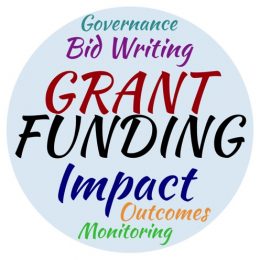 Introducing Julia
Introducing Julia
I have known Julia Miller as a friend for many years. I know her heart for the poor (see bio below) and her success in raising funds to help churches in their ministries. Although she no longer works as a fundraiser her experience is invaluable. So I was delighted when she accepted my invitation to write a series for me on this important subject.
Getting the Foundations right – How to be funding ready
Unfortunately there are no ‘quick fixes’ when it comes to applying for funds. Standard funding letters  can have some success, but in general they only generate small donations. A bit like tailoring your CV to each different job you apply for, grant funding applications are most effective when they are individually written and tailored to ensure you match your project, as best as possible, with what the funder wants to fund. It will take hard work, time and attention to detail, because how you apply tells the funder a lot about you and how you organise your ministry. So don’t rush it and make sure you check everything. You won’t get a second chance to make a good first impression.
can have some success, but in general they only generate small donations. A bit like tailoring your CV to each different job you apply for, grant funding applications are most effective when they are individually written and tailored to ensure you match your project, as best as possible, with what the funder wants to fund. It will take hard work, time and attention to detail, because how you apply tells the funder a lot about you and how you organise your ministry. So don’t rush it and make sure you check everything. You won’t get a second chance to make a good first impression.
What are funders looking for?
When seeking funds it is really helpful to try and look at your application with the eyes of a funder. What do they need to know to decide to invest their funds in your project?
Here are some key points to consider:
- Know what you want to do and why you need their funding
 The ‘ask’ for funding needs to be clear and directly linked to the changes you are expecting to see happen as a result of this project. How much funding do you need, what are you going to spend it on and what difference will it make.
The ‘ask’ for funding needs to be clear and directly linked to the changes you are expecting to see happen as a result of this project. How much funding do you need, what are you going to spend it on and what difference will it make. - Match ‘the ask’ with the outcomes that the funder wants to support
Be intentional with the language you use, so that it matches their terminology and they understand what you are planning to deliver. You might want to run a coffee morning because you think it would be nice for people to be able to get together. But the funder might miss the relevance of your project if you don’t mention the difference you expect to make in your community in terms of social isolation and loneliness, mental health and wellbeing, sense of belonging etc.Please don’t waste time applying if they don’t support what you want to deliver! - Charitable objects
Make sure that what you are applying to do is allowed by your charity objects/constitution. It may sound obvious but is easily overlooked especially with long established charities. For example, some constitutions do not allow charities to employ staff or work outside a specific geographical boundary. If you are not sure what yours says, please do find it and have a look! - Good Governance
Funders are always taking a risk when they decide to fund a new project. Being able to demonstrate good governance in the running of your organisation will help to give confidence to the funder that you will be able to manage their funds well and deliver what you have said you will. A track record of funded activity will help with this, and so will having sound financial practices in place, for example: having 3 unrelated signatories on the bank account and two people needed to authorise payments (more about financial management in part 2). Good governance also involves making sure you have the right policies and procedures in place, and it’s best to have these established before making your application. You will need to have (as a minimum) policies that cover:
Good governance also involves making sure you have the right policies and procedures in place, and it’s best to have these established before making your application. You will need to have (as a minimum) policies that cover:
– Safeguarding. How to handle concerns or allegations well if you are working with Children and/or Vulnerable Adults, as volunteers or as clients.
– Equal Opportunities. Often referred to as Equality and Diversity, this focuses on equal access to activities and opportunities for staff, volunteers and users of your services, and it should reference the Equality Act 2010.
There is a raft of other policies and procedures that charities should also have in place, such as Health and Safety (including undertaking Risk Assessments), Data Protection and GDPR, and a Financial Reserves Policy. Just because the funder may not ask to see these does not mean you don’t need to have them in place. Some are legal requirements, others are best practice. Adequate insurance such as public liability/employer liability are also likely to be needed.
This may all sound quite complicated or very dull, but good governance really does help a charity to be a safe and healthy place for staff, volunteers and clients. Being able to demonstrate this is likely to impress a potential funder.
Next time we will consider further aspects of how to think like the funder and improve your chances of success in applying for grants.
About Julia
 Julia is passionate about the church making a difference in its local community – especially for people in need. She has been actively involved in leading and supporting charities for more than 20 years, particularly faith-based charities and social enterprises. In the process she has secured in excess of £2 million funding primarily from grant making trusts.
Julia is passionate about the church making a difference in its local community – especially for people in need. She has been actively involved in leading and supporting charities for more than 20 years, particularly faith-based charities and social enterprises. In the process she has secured in excess of £2 million funding primarily from grant making trusts.
Julia now works as the Community Manager for Kingsgate Community Church in Great Yarmouth and also leads Pathways from Poverty, an initiative of the Relational Mission family of churches (one of the Newfrontiers apostolic spheres), which encourages and equips local churches to see the poor empowered and communities transformed.
